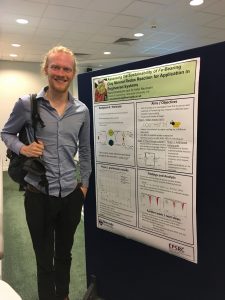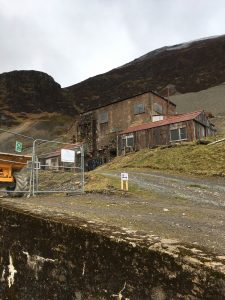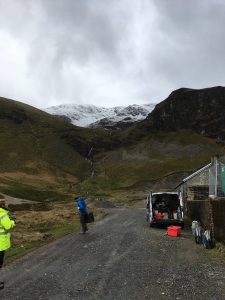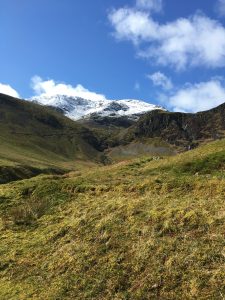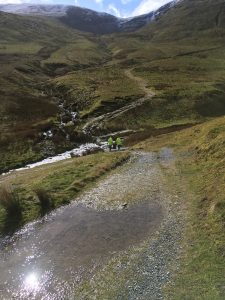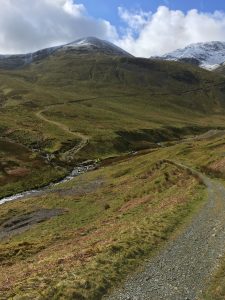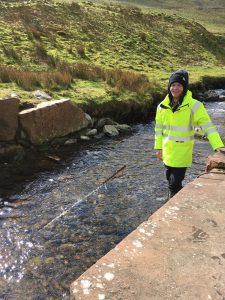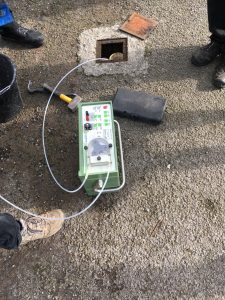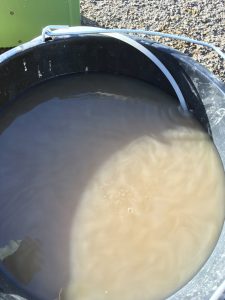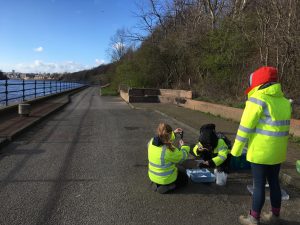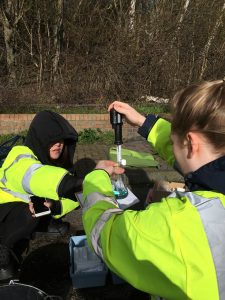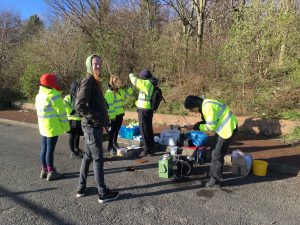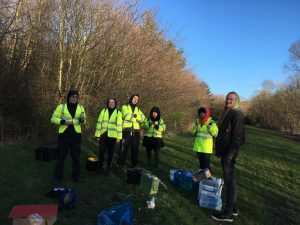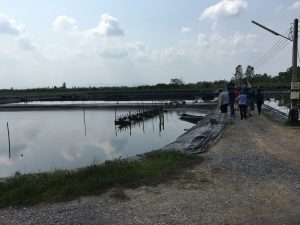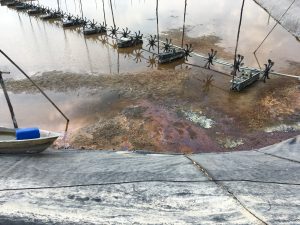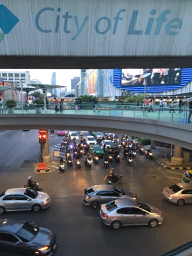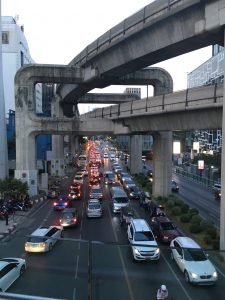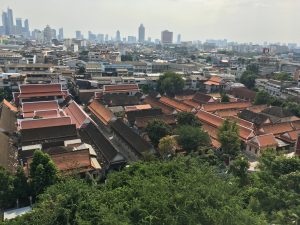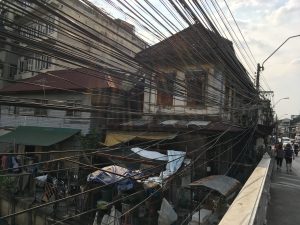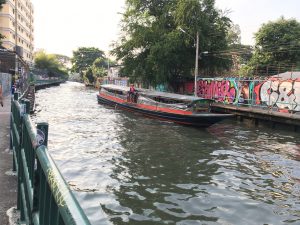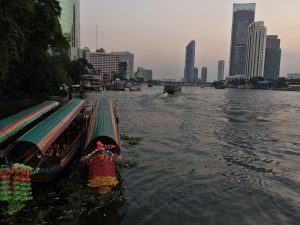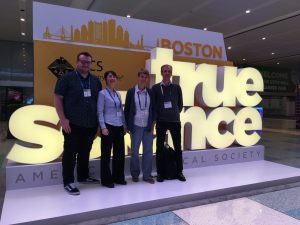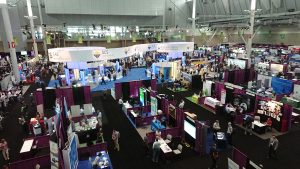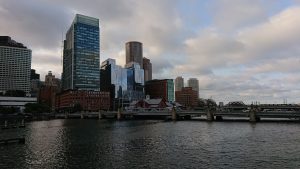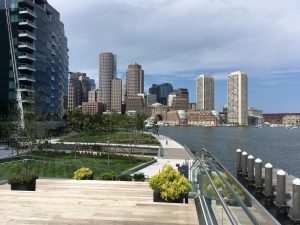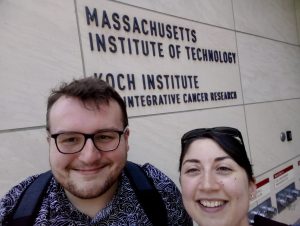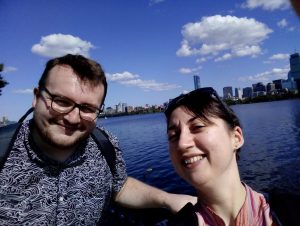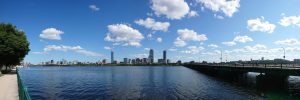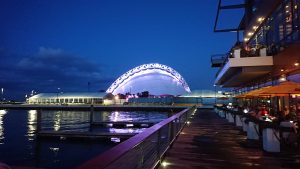In her PhD project, Kat Neate is focusing on Quantifying the importance of different sources of diffuse pollution in mining-impacted rivers. On 2 March 2019, the supervisory team (Adam Jarvis, Anke Neumann) set out with Kat for a first sampling of mine-impacted water of the Coledale Beck at Force Crag and for a reconnaissance of the potential diffuse sources of pollution to plan the strategies for assessment. Overall: a successful field trip, in a wonderful location with very interesting weather…
NEWS
Groundwater sampling for module CEG8111
On March 12, a group of 5 students set out to sample groundwater at the former site of the St Anthony Lead Works in Byker. This sampling campaign was part of the module CEG8111 Environmental Fate of Contaminants that has been developed and is led by Anke.
The aim of the sampling was to assess whether the remediation efforts carried out over 10 years ago were successful or whether the groundwater from the site was still a source of metal contamination to the river Tyne.
The sampling was only possible through the fantastic support by Philip Hartley and Thomas Brown of Newcastle City Council as well as demonstrator Harry.
Congratulations Dr Kath Rothwell!
Fully funded PhD studentship available
*PhD opportunity – application deadline: 28 February 2019*
Project: Harnessing microbially mediated redox processes for sustainable water treatment (lead: Dr Anke Neumann, in collaboration with Dr James Kitson)
Funding: EPSRC DTP; earmarked for this project, so selection ONLY based on qualification for and fit to the project!
Apply for this project using code ENG037.
Anke participates in workshop in Bangkok
In January, Anke traveled to Bangkok to take part in a workshop organized by Denis Cumming (University of Sheffield) and Vissanu Meeyoo (Mahanakorn University of Technology). Funded by the British Council and the Thailand Research Fund, the workshop aimed to bring together researchers from Thailand and the UK working on energy storage and water treatment to develop novel research ideas for sustainable shrimp farming. The field trip to a working organic shrimp farm was very illustrative and inspiring and Anke made many new connections with researchers from the UK and Thailand during the workshop.
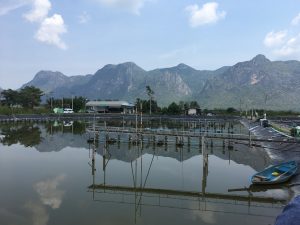
Fully funded PhD positions available
We have 4 fully funded PhD positions available in the Neumann lab or in collaboration with the Neumann lab. Funding available covers 3.5 year PhD studentships, starting September 2019.
APPLY NOW AND BEFORE 18 January 2019 for these two projects:
- Evaluating a novel oxidation process for the environmental fate of pesticides; a collaborative project with Chris Greenwell and Kislon Voitchovsky from the University of Durham.
- Metal and sulphur dynamics in compost bioreactor systems for treatment of metal polluted waters; a project led by Adam Jarvis (Newcastle University) and in collaboration with Christian Schröder (University of Stirling).
APPLY NOW AND BEFORE 31 January 2019 for this project (code: ENG037):
- Harnessing microbially mediated redox processes for sustainable water treatment; an interdisciplinary project in collaboration with James Kitson (Newcastle University).APPLY NOW AND BEFORE 31 January 2019 for this project following the guidance:
- Understanding the role of clay mineral redox reactions for metal contaminant fate (lead: Dr Anke Neumann, supervisory team tbc in dialogue with the PhD student)
Recent paper in ESPI selected as ‘HOT Article’
We recently received news that our article “Reduction of PCE and TCE by magnetite revisited” published in Environmental Science: Processes and Impacts was selected by the handling Editor as one of the top 10% of papers. ‘This selection is based on the exceptionally positive referee reports that your manuscript received during peer review, along with the Editor’s assessment of the significance and impact of the paper.’
Jim, Pani, and Anke present at the ACS national meeting in Boston
Pani writes: “Anke and Pani presented at the 256th ACS National Meeting in Boston, MA held on August 19-23, 2018 in the division of environmental chemistry. Both presentations covered applications of clay minerals on removing organic contaminants and antibiotic resistance genes in different types of water, where interesting questions and comments were raised relative to the oxidative potential of clay minerals. We enjoyed real science on a variety of conventional and novel technologies in terms of transforming and removing contaminants and pathogens focused on different types of water as well as networking opportunities where we had the chance to interact with scientists from all over the world. Both conference sections and a bit of Boston exploration made the ACS National Meeting an exciting experience!”
Jim says: “This summer I visited the USA for a second time to attend the ACS National Meeting in Boston, MA, after being fortunate enough to be awarded a Student Travel Grant by the Geochemistry Division. At the meeting, I presented my work on Fe-reduced clay minerals, and their impact on degradation of chlorinated solvents which are one of the most widely occurring classes of groundwater pollutants. Whilst at the meeting, I gained an appreciation for other research on aqueous-mineral interactions and their impact on groundwater contamination such as encapsulation of heavy metals within precipitates, as well as emerging contaminants of concern such as PFAS and PFOA and the challenges they present to providing clean groundwater. As well as the conference, Pani and myself spent a day touring around some sites of Boston, including the Museum of Fine Art, MIT and Harvard campuses. Overall, the trip was thoroughly worthwhile and enjoyable, and I finally got to try lobster for the first time.”
Anke also enjoyed the conference and felt especially honored to present in the Symposium by the RSC Environmental Science Journals Showcasing Emerging Investigators. In addition to enjoying great science, this also allowed for meeting old and new friends, and I even managed to meet up with a friend and colleague from Iowa (who just finished her PhD at MIT) and a walk through the city.
Impressions from Pani and Jim’s exploration of Boston:
Jim wins travel award
Jim won a travel award from the ACS Geochemistry division to present his work at the fall ACS National meeting in Boston. He will present his work in a presentation titled Formation of mixed-valent nano-precipitates due to electron transfer: impact on chlorinated solvent degradation.
Well done Jim and congratulations!
Harry wins runner-up poster prize
Harry and Anke attended the Research in Progress Meeting of the Clay Minerals Group of the Mineralogical Society on 27 June in Sheffield. (Jim had to stay home with the flu, unfortunately.) Many thanks to the organisers Binoy Sakar and Francis Clegg for a well organised, interesting meeting showcasing the diversity of clay mineral science!
Harry presented his first poster and won the runner-up prize! Congratulations Harry, well done!
